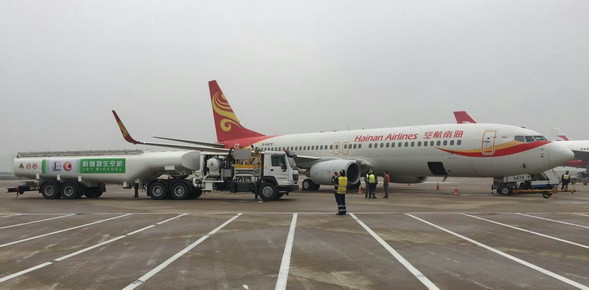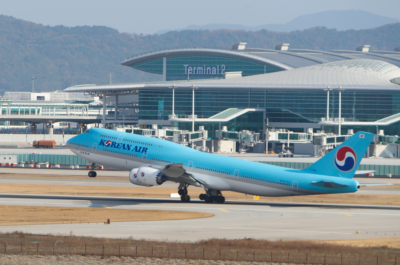Sustainably produced biofuel, which reduces carbon emissions by 50 to 80 percent compared to petroleum through its lifecycle, is expected to play a key role in supporting aviation's growth while meeting environmental goals.
BEIJING – Boeing [NYSE:BA], Hainan Airlines and Sinopec celebrated China’s first passenger flight with sustainable aviation biofuel, a key environmental milestone for China’s commercial aviation industry.
The regularly scheduled Hainan Airlines flight – which carried more than 100 passengers from Shanghai to Beijing in a Next-Generation 737-800 – used biofuel made by Sinopec from waste cooking oil collected from restaurants in China. Both of the airplane’s CFM International CFM56-7B engines were powered by a fuel blend of approximately 50 percent aviation biofuel mixed with conventional petroleum jet fuel.
“We are honored to see our airplane fly on sustainable aviation biofuel from Shanghai to our nation’s capital,” said Pu Ming, vice president of Hainan Airlines, who piloted the plane. “As a fast-growing domestic and international carrier, Hainan Airlines is demonstrating our environmental commitment by showing that aviation biofuel can play a safe and effective role in China’s air transport system.“
“Boeing is proud to advance its decades-long partnership with China by collaborating closely with Hainan Airlines and Sinopec to achieve this significant milestone,” said Ian Thomas, president, Boeing China. “We thank and congratulate our partners, whose teamwork, vision and commitment to sustainable aviation are helping to improve our industry and our environment for the long term.“
Sustainably produced biofuel, which reduces carbon emissions by 50 to 80 percent compared to petroleum through its lifecycle, is expected to play a key role in supporting aviation’s growth while meeting environmental goals. The Boeing Current Market Outlook has forecast that China will require 6,020 new airplanes by 2033 to meet fast-growing passenger demand for domestic and international air travel.
“We are very pleased to work together with Hainan Airlines, China National Aviation Fuel and Boeing to accomplish this remarkable flight, which is a milestone,” said Sinopec spokesperson Lv Dapeng. “For many years, Sinopec has maintained a leadership role in China in terms of the development and application of biomass fuel including aviation biofuel and bio-diesel. This fully represents an earnest commitment from Sinopec to continuously advance scientific and technological innovation and promote green and low-emission development.“
In China, Boeing collaborates with a wide range of stakeholders to develop a new sustainable aviation biofuel industry. In 2011, Air China conducted China’s first aviation biofuel test flight in a Boeing 747-400 using China-grown, jatropha-based biofuel. Boeing also partners with the Commercial Aviation Corp. of China (COMAC) and several research institutions, including Chinese Academy of Science’s Qingdao Institute of Bioenergy and Bioprocess Technology (QIBEBT), on aviation biofuel development.
Boeing also works with airlines, research institutions, governments and other stakeholders to develop sustainable aviation biofuel in the United States, Africa, Australia, Brazil, Europe, Japan and the Middle East.
Theodore is the Co-Founder and Managing Editor of TravelDailyNews Media Network; his responsibilities include business development and planning for TravelDailyNews long-term opportunities.















































![[PR] PR_Ascott and Vimut Hospital_2024](https://www.traveldailynews.asia/wp-content/uploads/2024/04/PR-PR_Ascott-and-Vimut-Hospital_2024-400x265.jpg)


















